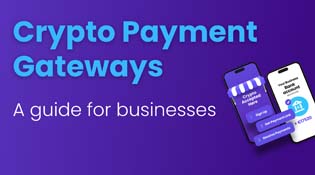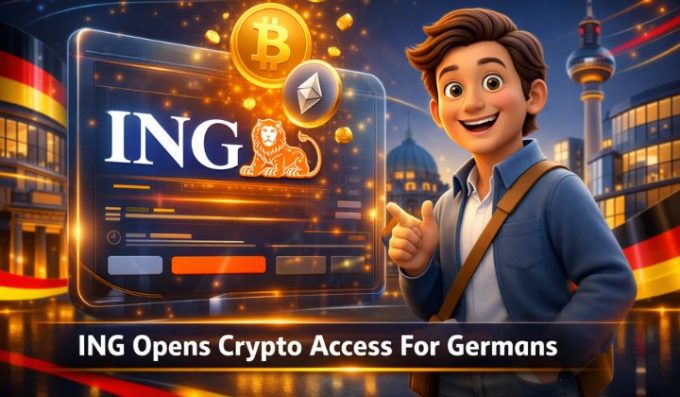
The Digital Cash Register of the Future
E-commerce is changing, and how we pay for things is becoming way more advanced, basically shaking up the old idea of payment systems. Standing out in this change is the crypto payment gateway. It’s a really important middleman, connecting customers who use cryptocurrencies to stores that would rather use regular money.
This tech upgrade is especially worth paying attention to since more businesses are expected to start using cryptocurrencies by 2025; this suggests consumers are changing their habits. The use of crypto payment gateways simplifies transactions through their ability to generate special payment addresses and QR codes which integrate seamlessly with existing systems.
The ability to convert cryptocurrencies into standard currency enhances their utility because digital assets tend to be volatile. The dual functionality of these gateways simplifies payments while expanding market reach which makes them essential for businesses targeting tech-savvy customers worldwide. The entire system becomes clear when you look at the picture.

The chart illustrates various metrics related to the crypto payment gateway market and consumer perceptions. It shows the market size for 2023 and projected values for 2025 and 2030, alongside consumer perceptions about the risks of cryptocurrencies. Additionally, it highlights the expected adoption of crypto payment options and the revenue growth reported by US-based providers. The data emphasizes the growth potential and challenges within the evolving landscape of electronic commerce.
How Does Crypto Payment Gateway Work?
The process of facilitating cryptocurrency transactions relies on user interactions with the crypto payment gateway which operates at a high level of complexity. The payment process begins when a customer selects cryptocurrency as their payment method and the gateway generates a special payment address or QR code which the customer can easily scan.
This code? The transaction needs to be routed directly to the blockchain network. The blockchain verifies the transaction after submission to ensure both security and authenticity. The merchant determines the next steps after receiving the payment because the gateway has the option to convert cryptocurrency to fiat currency immediately which protects against market volatility and enables fund transfers.
Comparatively, this entire process is remarkably faster than traditional systems, notorious for longer settlement times. As has been highlighted in previous analysis, a cryptocurrency payment gateway—a service enabling merchants to accept payments in cryptocurrencies like Bitcoin—underscores its role in modern financial transactions.
Thus, you see, the efficiencies and flexibility of crypto payment gateways mark a pretty interesting evolution in digital commerce.

Why Crypto Payment Gateways Are Important for Merchants?
The move toward digital currencies in e-commerce means more and more merchants are seeing the upside of using crypto payment gateways. These gateways make it easier to deal with international customers, since they let businesses take payments from all over the world without the headaches of converting currencies.
Plus, they can seriously cut down on transaction fees when you compare them to regular credit card processors. The fees for credit card transactions range between 2% and 4% but crypto gateways charge between 0.5% and 1%.
The security features of blockchain technology prevent chargebacks from occurring which benefits merchants who need to protect their cash flow from potential fraudulent disputes. The adoption of new payment options enables merchants to attract crypto enthusiasts who become essential for maintaining market competitiveness.
Integrating these gateways is becoming really important if businesses want to do well in a digital-first economy, as we can see from how they’re being used more and more around the world.
Crypto vs Traditional Payment Gateways Comparison 2025:

How to Accept Bitcoin Payments on Website?
A step-by-step guide exists for website owners who want to start accepting Bitcoin payments.
Website owners can accept Bitcoin payments through cryptocurrency payment gateways or by installing plugins that support Bitcoin transactions. Payment gateways perform functions identical to conventional payment processors by enabling you to accept Bitcoin payments and subsequently exchange them into your desired fiat currency. You can accept Bitcoin payments by establishing a Bitcoin wallet then giving customers your public address to send funds directly to you.
Here’s a more detailed breakdown:
1. Choose a Cryptocurrency Payment Gateway:
- What they do: The payment gateways manage cryptocurrency transactions through Bitcoin conversion to your selected currency (USD or EUR) and transaction management operations.
- Popular Options: The three most well-known providers of cryptocurrency payment services include BitPay and Coinbase Commerce and CoinGate and NOWPayments.
- Integration: Payment gateways provide simple API integrations as well as plugins for popular e-commerce platforms like WooCommerce that enables easy Bitcoin payment option implementation on websites.
2. Set Up Your Gateway Account and Wallet:
- Sign up: Create an account with your chosen payment gateway.
- Payment gateways require API key generation for establishing website connections.
- Payout Wallet: Configure the wallet where you want to receive your payouts (either in Bitcoin or your chosen fiat currency).
3. Integrate the Payment Gateway on Your Website:
- E-commerce Platform: Search for the Bitcoin payment plugin from your selected gateway within WooCommerce and follow their guidelines to install and configure it.
- Manual Integration: The gateway provides HTML code snippets for website owners who do not have platform-supported plugins.
4. Testing and Security:
- Test Transactions: Before opening your website to customers you should run test transactions to verify proper functionality.
- Security: The security of your gateway account will be enhanced by enabling two-factor authentication (2FA).
5. Alternatives to Payment Gateways:
- Direct Bitcoin Payments: You can provide your Bitcoin wallet address directly to customers.
- Manual Payments: Customers can send Bitcoin to your wallet and you verify transactions manually before fulfilling orders.
6. Considerations:
- Fees: Be aware of transaction fees associated with the payment gateway.
- Volatility: Cryptocurrency values can fluctuate. Your decision will be either to convert Bitcoin to fiat currency immediately or keep it as an investment asset.
- Customer Experience: Make it clear to your customers how to pay with Bitcoin and ensure a smooth checkout process.
The implementation of Bitcoin payment functionality for your website becomes possible through these instructions which guide you through the process.
Best Crypto Payment Gateways: Top Crypto Payment Gateways of 2025
1. NOWPayments
- The platform accepts more than 300 cryptocurrencies and over 75 different fiat currencies.
- The platform operates with fees as low as 0.5% and provides fiat conversion services and API integration and plugin deployment and payment button and subscription tool capabilities. (NOWPayments)
2. Coinbase Commerce
- The platform exists within the Coinbase ecosystem.
- The platform lets merchants receive crypto payments through three different checkout methods including hosted checkouts and invoices and payment buttons and integrates with all Coinbase features. (Wikipedia)
3. BitPay
- Established since 2011 with global merchant adoption.
- The platform allows users to pay with cryptocurrency and receive instant settlements as well as debit card payouts while maintaining widespread recognition among users. (Wikipedia, Best Bitcoin & Crypto Payment Processor)
4. Shift Markets
- The platform provides users with wallets together with payments functionality and liquidity pool management and fiat on/off ramp solutions.
- The platform serves exchanges and brokers and fintech firms which need advanced features together with scalable solutions. (Shift Markets)
Quick Comparison: Gateway Key Strengths
- NOWPayments: Broad crypto support, low fees, developer-friendly tools
- Coinbase Commerce: Easy integration, trusted brand, merchant tools
- BitPay: Long track record, wide merchant acceptance, debit card access
- Coingate: Plugin-rich for e-commerce, flexible payment options
- Shift Markets: Comprehensive backend for institutional-grade platforms
Why These Gateways Matter?
- The payment processing solutions offer merchants better rates than traditional processors while eliminating chargeback risks for improved control.
- These integration solutions (APIs and plugins and hosted checkout) help businesses achieve quick and scalable adoption.
- Both consumers and businesses can use the available cryptocurrencies which span from Bitcoin to stablecoins.
- The payment gateways offer reliable secure cost-effective cryptocurrency acceptance solutions for both e-commerce sites and fintech platforms in 2025.
Conclusion
The continued evolution of our digital economy shines an ever-brighter light on the importance of adopting fresh payment solutions. It’s more than just a passing fad: integrating crypto payment gateways is really a necessity if merchants want to do well in a competitive market.
These gateways are key infrastructure for today’s e-commerce because they make transactions faster, cheaper, and borderless. Businesses can accept different kinds of cryptocurrencies, which grows their customer base while cutting transaction fees and getting rid of chargeback worries.
The comparison between crypto and traditional payment gateways in 2025 demonstrates that crypto solutions offer better advantages through reduced costs and immediate settlement capabilities. Businesses that implement cryptocurrency payment systems position themselves well in the rapidly changing market because their customers increasingly use digital currencies.
The utility of crypto payment gateways extends beyond usefulness because they establish the future operational framework for transactions and consumer financial interactions.

Image1. Key features and functions of payment gateways in e-commerce.
References:
- Ishan Roy. ‘Blockchain Development for Finance Projects.’ Building next-generation financial applications using Ethereum, Hyperledger Fabric, and Stellar, Packt Publishing Ltd, 1/31/2020
- S Williams. ‘The Digital Checkout: Cryptocurrency Payments and the Future of E-Commerce.’ NFT Publishing, 4/14/2025
- Ekaterina V. Kharchenko. ‘Digital Future Economic Growth, Social Adaptation, and Technological Perspectives.’ Tatiana Kolmykova, Springer Nature, 4/6/2020
- NOWPayments
- Wikipedia
- Wikipedia
- Best Bitcoin & Crypto Payment Processor
- Best Bitcoin & Crypto Payment Processor
- Antier Solutions
- Shift Markets
Image References:
- Image: Key features and functions of payment gateways in e-commerce., Accessed: 2025. https://images.stripeassets.com/fzn2n1nzq965/1zViKOza59SLm1LbVJq310/1268cd614f8bbd5b2bafd6b1bb60b893/Key-features-of-payment-gateways.png?w=2242&q=80
You need to login in order to Like




















Leave a comment